外研版七年级英语上册课件 Module 5 Unit 3 Language in use. (共35张PPT)
文档属性
| 名称 | 外研版七年级英语上册课件 Module 5 Unit 3 Language in use. (共35张PPT) |

|
|
| 格式 | ppt | ||
| 文件大小 | 1.3MB | ||
| 资源类型 | 教案 | ||
| 版本资源 | 外研版 | ||
| 科目 | 英语 | ||
| 更新时间 | 2022-07-26 00:00:00 | ||
图片预览

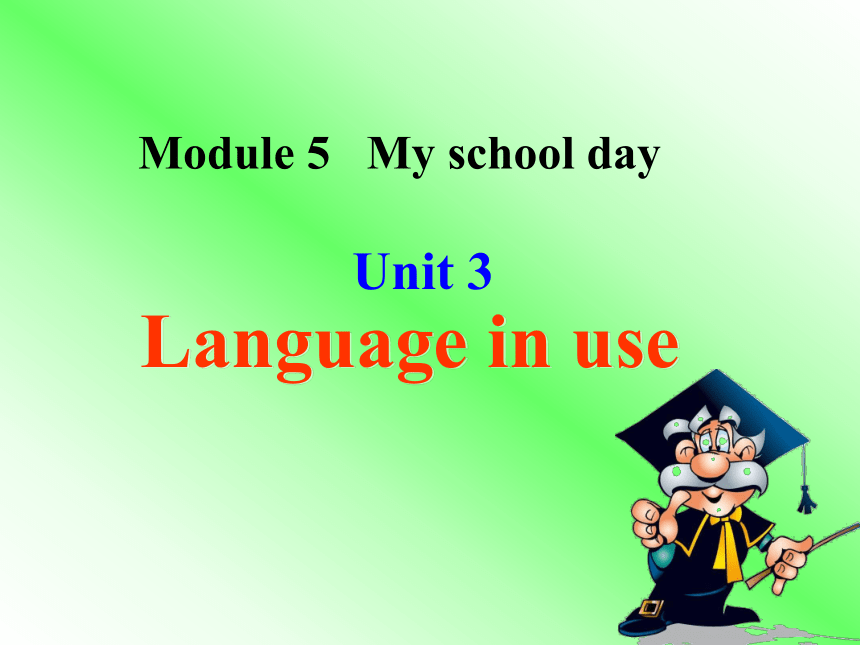
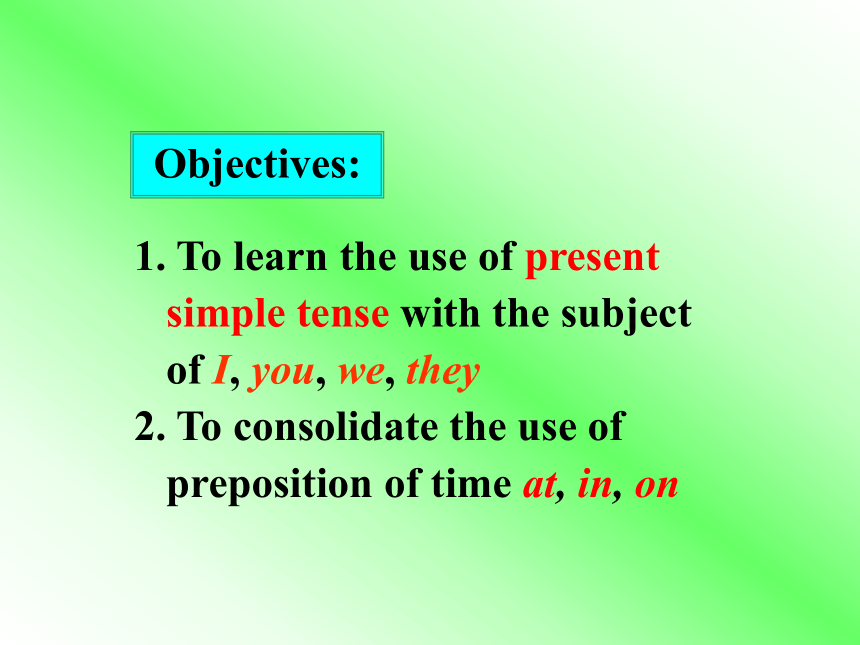
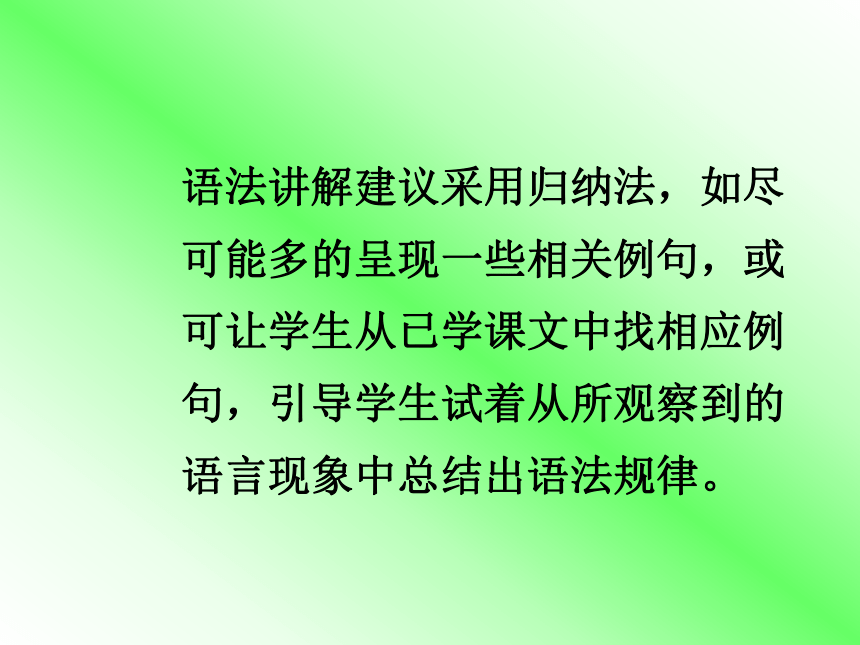
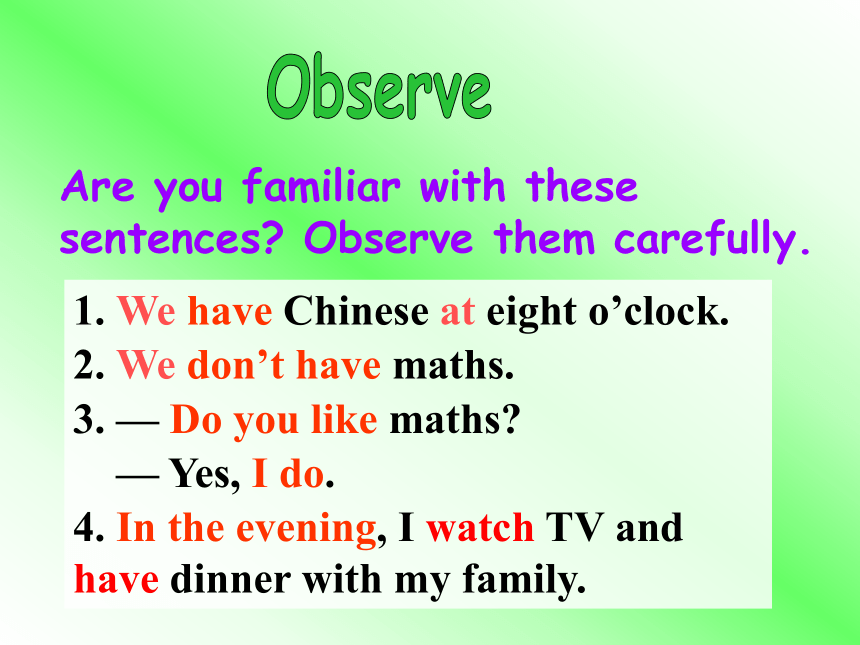
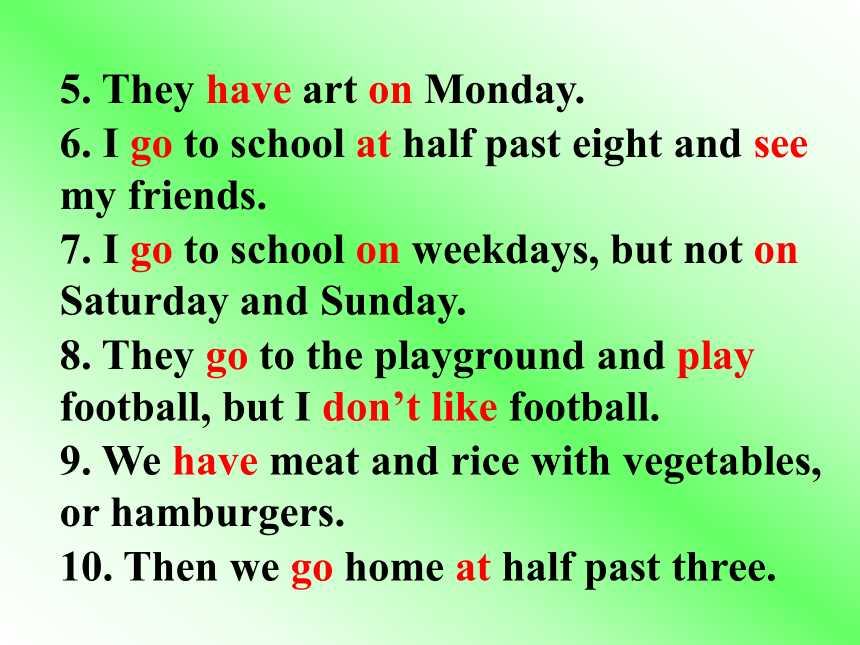
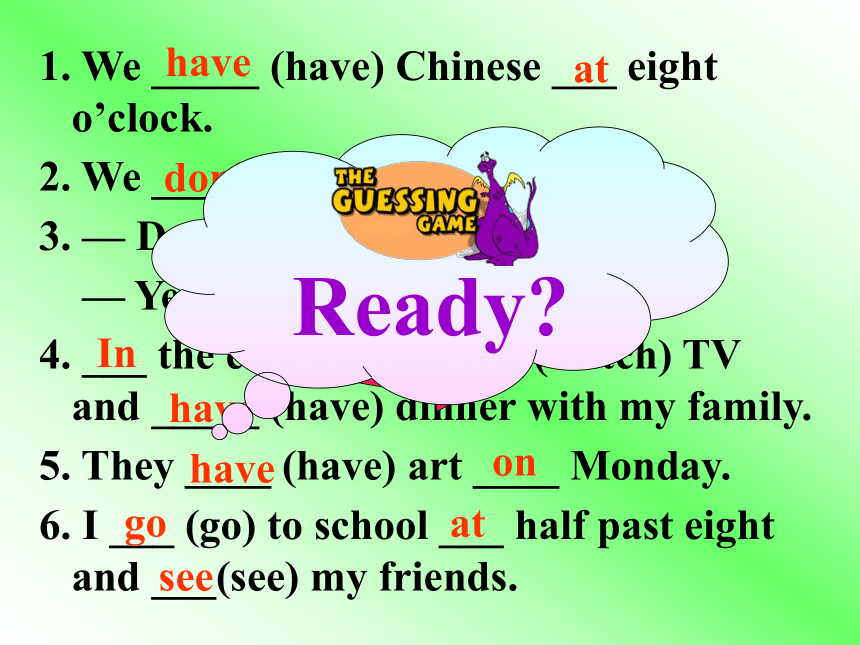
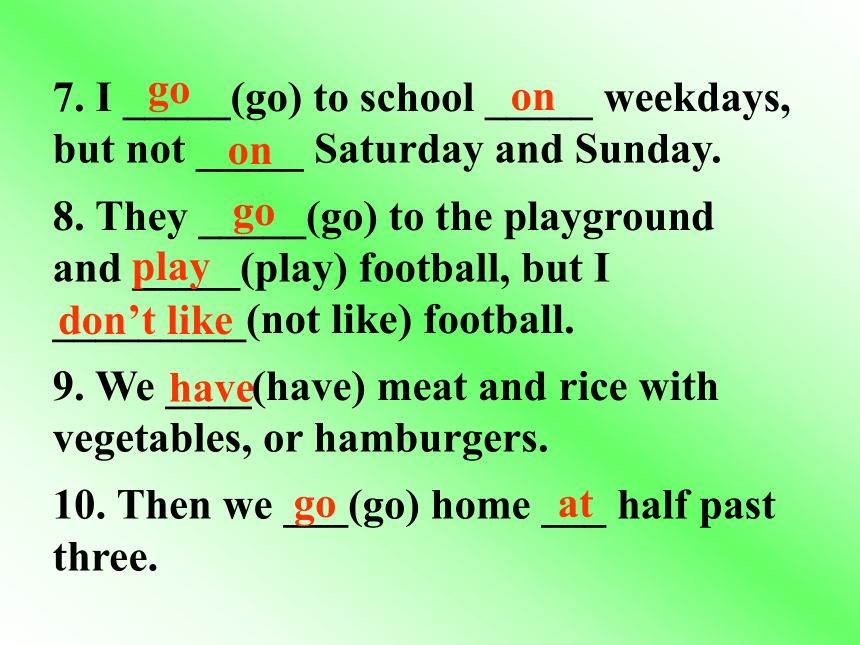
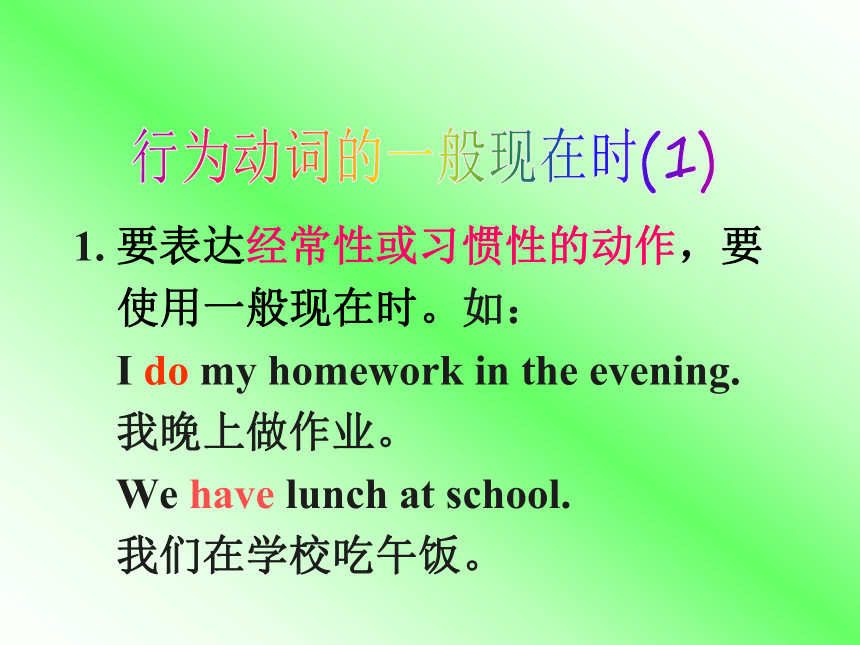

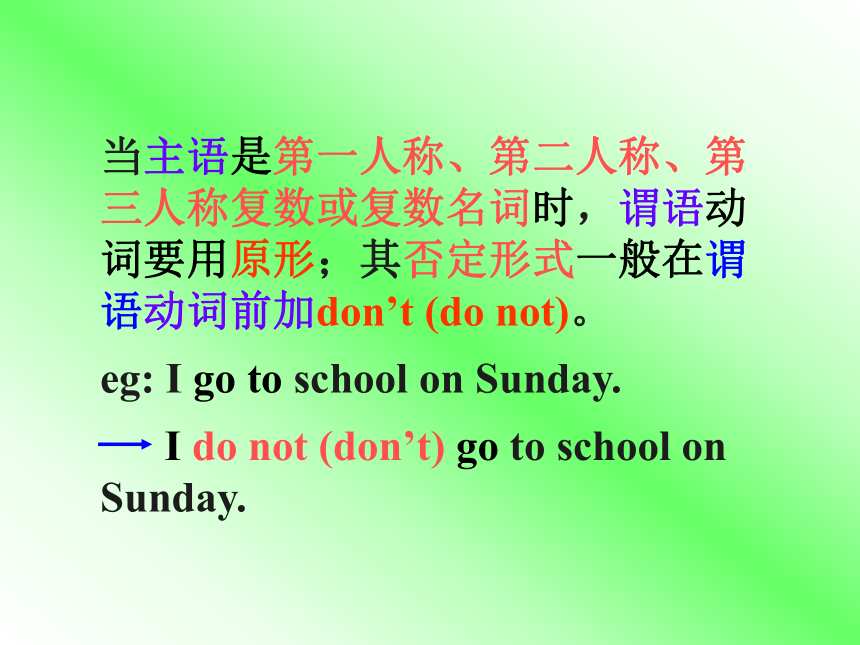
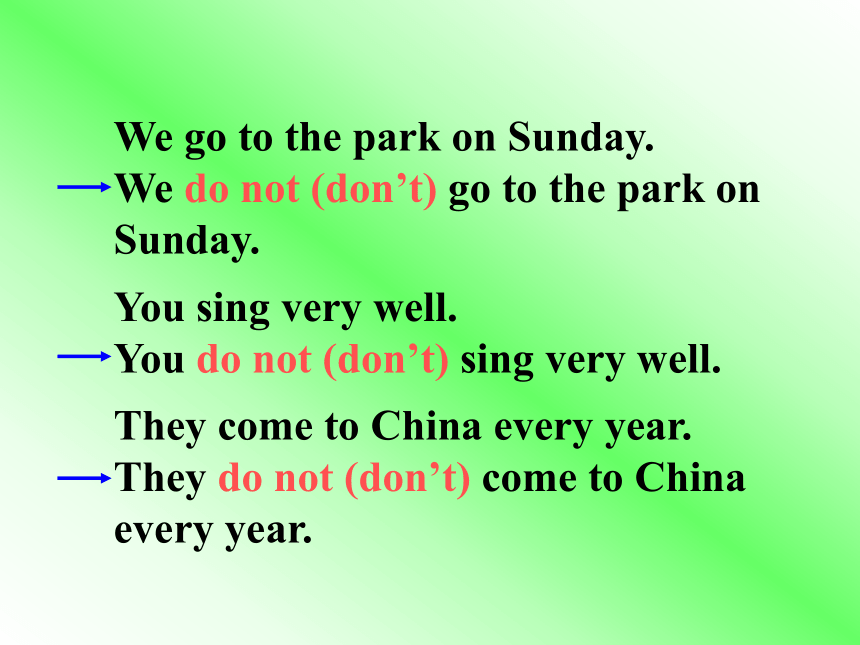
文档简介
(共35张PPT)
外研
七年级 上册
Unit 3
Language in use
Module 5 My school day
Objectives:
To learn the use of present simple tense with the subject of I, you, we, they
2. To consolidate the use of preposition of time at, in, on
语法讲解建议采用归纳法,如尽可能多的呈现一些相关例句,或可让学生从已学课文中找相应例句,引导学生试着从所观察到的语言现象中总结出语法规律。
1. We have Chinese at eight o’clock.
2. We don’t have maths.
3. — Do you like maths
— Yes, I do.
4. In the evening, I watch TV and have dinner with my family.
Are you familiar with these sentences Observe them carefully.
5. They have art on Monday.
6. I go to school at half past eight and see my friends.
7. I go to school on weekdays, but not on Saturday and Sunday.
8. They go to the playground and play football, but I don’t like football.
9. We have meat and rice with vegetables, or hamburgers.
10. Then we go home at half past three.
We _____ (have) Chinese ___ eight o’clock.
2. We __________(not have) maths.
3. — Do you like maths
— Yes, I ___(do).
4. ___ the evening, I _____ (watch) TV and _____ (have) dinner with my family.
5. They ____ (have) art ____ Monday.
6. I ___ (go) to school ___ half past eight and ___(see) my friends.
have
don’t have
do
In
watch
have
have
on
go
at
see
at
go
Ready
7. I _____(go) to school _____ weekdays, but not _____ Saturday and Sunday.
8. They _____(go) to the playground and _____(play) football, but I _________(not like) football.
9. We ____(have) meat and rice with vegetables, or hamburgers.
10. Then we ___(go) home ___ half past three.
go
on
on
go
play
don’t like
have
go
at
1. 要表达经常性或习惯性的动作,要
使用一般现在时。如:
I do my homework in the evening.
我晚上做作业。
We have lunch at school.
我们在学校吃午饭。
2. 要表示现在的状态,也可以用 一般现在时。如:
I know him very well.
我和他很熟。
I like English very much.
我非常喜欢英语。
当主语是第一人称、第二人称、第三人称复数或复数名词时,谓语动词要用原形;其否定形式一般在谓语动词前加don’t (do not)。
eg: I go to school on Sunday.
I do not (don’t) go to school on Sunday.
We go to the park on Sunday.
We do not (don’t) go to the park on Sunday.
You sing very well.
You do not (don’t) sing very well.
They come to China every year.
They do not (don’t) come to China every year.
在表述日常行为时会用到时间,要注
意英汉不同的时间表达方式, 试比较:
at half past six (6:30) 在6点半
at five past six (6:05) 在6点5分
at twenty to seven (6:40) 在6点40分
注意:
如果是半小时以内的时间,一般用几点过几分的表达方式,即“…past…”,如:
5:25可以表达为twenty-five past five;
如果超过了半小时,则用还差几分不到几点的表达方式,即 “…to…”, 如:
5:45 就要表达为 fifteen to six。
at 具体时刻
in 在上午/下午/晚上
on 在某一天或某一天(的上午/下午/晚上)
Recall the use of at, in or on.
in / on / at + 时间
at
ten o’clock
night
noon
the morning
the afternoon
the evening
in
on
Monday
Tuesday morning
a warm morning
We have ____ English at 9:00 and have ______ break at 10:00.
A. an; a B. /; a C. an; /
2. They have an English lesson _______ three o’clock ____ Tuesday.
A. at; on B. in; on C. at; in
3. I go to school ______ 8 o’clock in the morning.
A. at B. in C. on D. for
4. We usually have a football match
_____ Sunday.
A. in B. on C. at D. to
5. — What time do you usually have
your first class
— ______ eight o’clock _____ the
morning.
A. At, on B. At, in C. On, in
以下部分为课本练习,供老师在对答案时选择使用。
Talk about your activities in a week.
I don’t go to school on Sunday.
I go to park on Sunday.
P30
1
Match the words in Column A with the words and expressions in Column B.
A
B
1 have
2 do
3 go
a) dinner
b) your homework
c) to school
d) a break
e) an English lesson
f) to bed
g) home
Now talk about your school day.
I go to school at half past seven in the morning.
P30
2
Complete the passage with the expressions from the box.
do homework get up go to school have a break have breakfast have lunch start work
P30
3
On Friday I have a busy day. I (1) ________ at half past six in the morning. Then I wash my hands and face, and (2) ____________ at seven. At half past seven, I (3) _________, and (4) ________ at eight. There are four lessons in the morning. At twenty to ten, we (5) _________ for twenty minutes. We go to the playground and I talk with my friends. We (6) ________ in the school dining hall. In the afternoon, we have two lessons and go home at half past three. I don’t (7) __________ on Friday evening. I do it on Saturday.
get up
have breakfast
start work
go to school
have a break
have lunch
do homework
Complete the sentences with at, in or on.
1 We go to school _____ the morning.
2 We don’t go to school _____ Sunday.
3 We don’t have a science lesson _____ Wednesday.
4 I get up ____ seven o’clock.
5 We go home _____ the afternoon.
6 We have dinner _____ half past six.
in
on
on
at
in
at
P31
4
Complete the sentences with the words from the box.
because break homework interesting subject
1. We have maths after _____ today.
2. I like maths. It’s my favourite _______.
3. Our maths teacher is very good and she makes it __________.
4. I like it ________ it’s interesting.
5. I do my maths _________ first after school every day.
break
subject
interesting
because
homework
P30
5
Talking about your ideal school day
Step 1: Look through Module 5 and find expressions to say what you do and enjoy every day.
go to school
play football
…
Now complete the table with information about your ideal school day.
8:00 am go to school
10:00 am …
12:00 am
…
Step 2: Work in pairs. Talk about your ideal school day.
1. 在表达经常性、习惯性的动作或现在的状态时要用一般现在时。
2. 第一、二人称的否定形式要在谓语动词前加don’t。
at + 具体时间点
in + 上午/下午/晚上
on + 具体某一天(的上午/下午/晚上)
Quiz
Ⅰ. 用方框中所给单词的正确形式填空。
face minute busy park wash
1. Our music class is about 45 ________.
2. —What a beautiful girl!
— Yes. Her eyes are big and her ________ is round (圆的).
3. There are some nice flowers in the _____.
4. Time for lunch. Please ________ your hands.
5. My father is a manager and he is very ________ every day.
minutes
face
park
wash
busy
Ⅱ. 用介词at, in, on完成句子。
1. They don’t work ________ Sunday.
2. I get up ________ six o’clock.
3. We have three lessons ________ the afternoon.
4. They have art ________ Thursday morning.
5. — Do you have lunch ________ half past eleven
—No, we don’t.
on
at
in
on
at
Ⅲ. 用括号内所给动词的正确形式填空。
1. They ________ (like) Chinese food.
2. _______ you ________ (watch) TV every evening
3. We ________ (not play) basketball on Monday.
4. Jim and Rose ________ (go) to school in the morning.
5. _______ Mike and you ________ (eat) vegetables every day
like
Do watch
don’t play
go
Do eat
Ⅳ. 从方框中选择恰当的句子完成对话,有两项多余。
A. Let’s go together (一起).
B. What’s your favourite subject, Mary
C. What time is it now
D. What about IT
E. My teacher makes it interesting.
F. I know you are good at art.
G. We have three lessons in the morning.
A: Hi, Li Kai.
B: Hi, Mary.
A: (1) ________
B: It’s half past seven.
A: Oh, it’s time to go to school.
B: (2) ________
A: OK. Do you have art this morning
B: Yes, we do. And art is my favourite subject.
A: (3) ________ Do you want to be an art teacher
B: Yes. (4) ________
A: My favourite subject is geography. I want to travel around the world in the future (将来).
B: I think you can do it. (5) ________
A: I like it too, because it is very interesting.
C
A
F
B
D
1. Review the grammar
we have learned today.
2. Finish the exercises in Learning English.
Homework
Preview the words and expressions in Module 6.
2. Search for some information about animals.
外研
七年级 上册
Unit 3
Language in use
Module 5 My school day
Objectives:
To learn the use of present simple tense with the subject of I, you, we, they
2. To consolidate the use of preposition of time at, in, on
语法讲解建议采用归纳法,如尽可能多的呈现一些相关例句,或可让学生从已学课文中找相应例句,引导学生试着从所观察到的语言现象中总结出语法规律。
1. We have Chinese at eight o’clock.
2. We don’t have maths.
3. — Do you like maths
— Yes, I do.
4. In the evening, I watch TV and have dinner with my family.
Are you familiar with these sentences Observe them carefully.
5. They have art on Monday.
6. I go to school at half past eight and see my friends.
7. I go to school on weekdays, but not on Saturday and Sunday.
8. They go to the playground and play football, but I don’t like football.
9. We have meat and rice with vegetables, or hamburgers.
10. Then we go home at half past three.
We _____ (have) Chinese ___ eight o’clock.
2. We __________(not have) maths.
3. — Do you like maths
— Yes, I ___(do).
4. ___ the evening, I _____ (watch) TV and _____ (have) dinner with my family.
5. They ____ (have) art ____ Monday.
6. I ___ (go) to school ___ half past eight and ___(see) my friends.
have
don’t have
do
In
watch
have
have
on
go
at
see
at
go
Ready
7. I _____(go) to school _____ weekdays, but not _____ Saturday and Sunday.
8. They _____(go) to the playground and _____(play) football, but I _________(not like) football.
9. We ____(have) meat and rice with vegetables, or hamburgers.
10. Then we ___(go) home ___ half past three.
go
on
on
go
play
don’t like
have
go
at
1. 要表达经常性或习惯性的动作,要
使用一般现在时。如:
I do my homework in the evening.
我晚上做作业。
We have lunch at school.
我们在学校吃午饭。
2. 要表示现在的状态,也可以用 一般现在时。如:
I know him very well.
我和他很熟。
I like English very much.
我非常喜欢英语。
当主语是第一人称、第二人称、第三人称复数或复数名词时,谓语动词要用原形;其否定形式一般在谓语动词前加don’t (do not)。
eg: I go to school on Sunday.
I do not (don’t) go to school on Sunday.
We go to the park on Sunday.
We do not (don’t) go to the park on Sunday.
You sing very well.
You do not (don’t) sing very well.
They come to China every year.
They do not (don’t) come to China every year.
在表述日常行为时会用到时间,要注
意英汉不同的时间表达方式, 试比较:
at half past six (6:30) 在6点半
at five past six (6:05) 在6点5分
at twenty to seven (6:40) 在6点40分
注意:
如果是半小时以内的时间,一般用几点过几分的表达方式,即“…past…”,如:
5:25可以表达为twenty-five past five;
如果超过了半小时,则用还差几分不到几点的表达方式,即 “…to…”, 如:
5:45 就要表达为 fifteen to six。
at 具体时刻
in 在上午/下午/晚上
on 在某一天或某一天(的上午/下午/晚上)
Recall the use of at, in or on.
in / on / at + 时间
at
ten o’clock
night
noon
the morning
the afternoon
the evening
in
on
Monday
Tuesday morning
a warm morning
We have ____ English at 9:00 and have ______ break at 10:00.
A. an; a B. /; a C. an; /
2. They have an English lesson _______ three o’clock ____ Tuesday.
A. at; on B. in; on C. at; in
3. I go to school ______ 8 o’clock in the morning.
A. at B. in C. on D. for
4. We usually have a football match
_____ Sunday.
A. in B. on C. at D. to
5. — What time do you usually have
your first class
— ______ eight o’clock _____ the
morning.
A. At, on B. At, in C. On, in
以下部分为课本练习,供老师在对答案时选择使用。
Talk about your activities in a week.
I don’t go to school on Sunday.
I go to park on Sunday.
P30
1
Match the words in Column A with the words and expressions in Column B.
A
B
1 have
2 do
3 go
a) dinner
b) your homework
c) to school
d) a break
e) an English lesson
f) to bed
g) home
Now talk about your school day.
I go to school at half past seven in the morning.
P30
2
Complete the passage with the expressions from the box.
do homework get up go to school have a break have breakfast have lunch start work
P30
3
On Friday I have a busy day. I (1) ________ at half past six in the morning. Then I wash my hands and face, and (2) ____________ at seven. At half past seven, I (3) _________, and (4) ________ at eight. There are four lessons in the morning. At twenty to ten, we (5) _________ for twenty minutes. We go to the playground and I talk with my friends. We (6) ________ in the school dining hall. In the afternoon, we have two lessons and go home at half past three. I don’t (7) __________ on Friday evening. I do it on Saturday.
get up
have breakfast
start work
go to school
have a break
have lunch
do homework
Complete the sentences with at, in or on.
1 We go to school _____ the morning.
2 We don’t go to school _____ Sunday.
3 We don’t have a science lesson _____ Wednesday.
4 I get up ____ seven o’clock.
5 We go home _____ the afternoon.
6 We have dinner _____ half past six.
in
on
on
at
in
at
P31
4
Complete the sentences with the words from the box.
because break homework interesting subject
1. We have maths after _____ today.
2. I like maths. It’s my favourite _______.
3. Our maths teacher is very good and she makes it __________.
4. I like it ________ it’s interesting.
5. I do my maths _________ first after school every day.
break
subject
interesting
because
homework
P30
5
Talking about your ideal school day
Step 1: Look through Module 5 and find expressions to say what you do and enjoy every day.
go to school
play football
…
Now complete the table with information about your ideal school day.
8:00 am go to school
10:00 am …
12:00 am
…
Step 2: Work in pairs. Talk about your ideal school day.
1. 在表达经常性、习惯性的动作或现在的状态时要用一般现在时。
2. 第一、二人称的否定形式要在谓语动词前加don’t。
at + 具体时间点
in + 上午/下午/晚上
on + 具体某一天(的上午/下午/晚上)
Quiz
Ⅰ. 用方框中所给单词的正确形式填空。
face minute busy park wash
1. Our music class is about 45 ________.
2. —What a beautiful girl!
— Yes. Her eyes are big and her ________ is round (圆的).
3. There are some nice flowers in the _____.
4. Time for lunch. Please ________ your hands.
5. My father is a manager and he is very ________ every day.
minutes
face
park
wash
busy
Ⅱ. 用介词at, in, on完成句子。
1. They don’t work ________ Sunday.
2. I get up ________ six o’clock.
3. We have three lessons ________ the afternoon.
4. They have art ________ Thursday morning.
5. — Do you have lunch ________ half past eleven
—No, we don’t.
on
at
in
on
at
Ⅲ. 用括号内所给动词的正确形式填空。
1. They ________ (like) Chinese food.
2. _______ you ________ (watch) TV every evening
3. We ________ (not play) basketball on Monday.
4. Jim and Rose ________ (go) to school in the morning.
5. _______ Mike and you ________ (eat) vegetables every day
like
Do watch
don’t play
go
Do eat
Ⅳ. 从方框中选择恰当的句子完成对话,有两项多余。
A. Let’s go together (一起).
B. What’s your favourite subject, Mary
C. What time is it now
D. What about IT
E. My teacher makes it interesting.
F. I know you are good at art.
G. We have three lessons in the morning.
A: Hi, Li Kai.
B: Hi, Mary.
A: (1) ________
B: It’s half past seven.
A: Oh, it’s time to go to school.
B: (2) ________
A: OK. Do you have art this morning
B: Yes, we do. And art is my favourite subject.
A: (3) ________ Do you want to be an art teacher
B: Yes. (4) ________
A: My favourite subject is geography. I want to travel around the world in the future (将来).
B: I think you can do it. (5) ________
A: I like it too, because it is very interesting.
C
A
F
B
D
1. Review the grammar
we have learned today.
2. Finish the exercises in Learning English.
Homework
Preview the words and expressions in Module 6.
2. Search for some information about animals.
同课章节目录
- Starte
- Module 1 My teacher and my friends
- Module 2 My English lesson
- Module 3 My English book
- Module 4 My everyday life
- Module 1 My classmates
- Unit 1 Nice to meet you.
- Unit 2 I'm Wang Lingling and I'm thirteen years ol
- Unit 3 Language in use.
- Module 2 My family
- Unit 1 Is this your mum?
- Unit 2 These are my parents.
- Unit 3 Language in use.
- Module 3 My school
- Unit 1 There are thirty students in my class.
- Unit 2 The library is on the left of the playgroun
- Unit 3 Language in use.
- Module 4 Healthy food
- Unit 1 We've got lots of apples.
- Unit 2 Is your food and drink healthy?
- Unit 3 Language in use.
- Module 5 My school day
- Unit 1 I love history.
- Unit 2 We start work at nine o'clock.
- Unit 3 Language in use.
- Revision module A
- Module 6 A trip to the zoo
- Unit 1 Does it eat meat?
- Unit 2 The tiger lives in Asia.
- Unit 3 Language in use.
- Module 7 Computers
- Unit 1 How do I write my homework on the computer?
- Unit 2 When do you use a computer?
- Unit 3 Language in use.
- Module 8 Choosing presents
- Unit 1 I always like birthday parties.
- Unit 2 She often goes to concerts.
- Unit 3 Language in use.
- Module 9 People and places
- Unit 1 We're enjoying the school trip a lot.
- Unit 2 They're waiting for buses or trains.
- Unit 3 Language in use.
- Module 10 Spring Festival
- Unit 1 Are you getting ready for Spring Festival?
- Unit 2 My mother's cleaning our houses and sweepin
- Unit 3 Language in use.
- Revision module B
